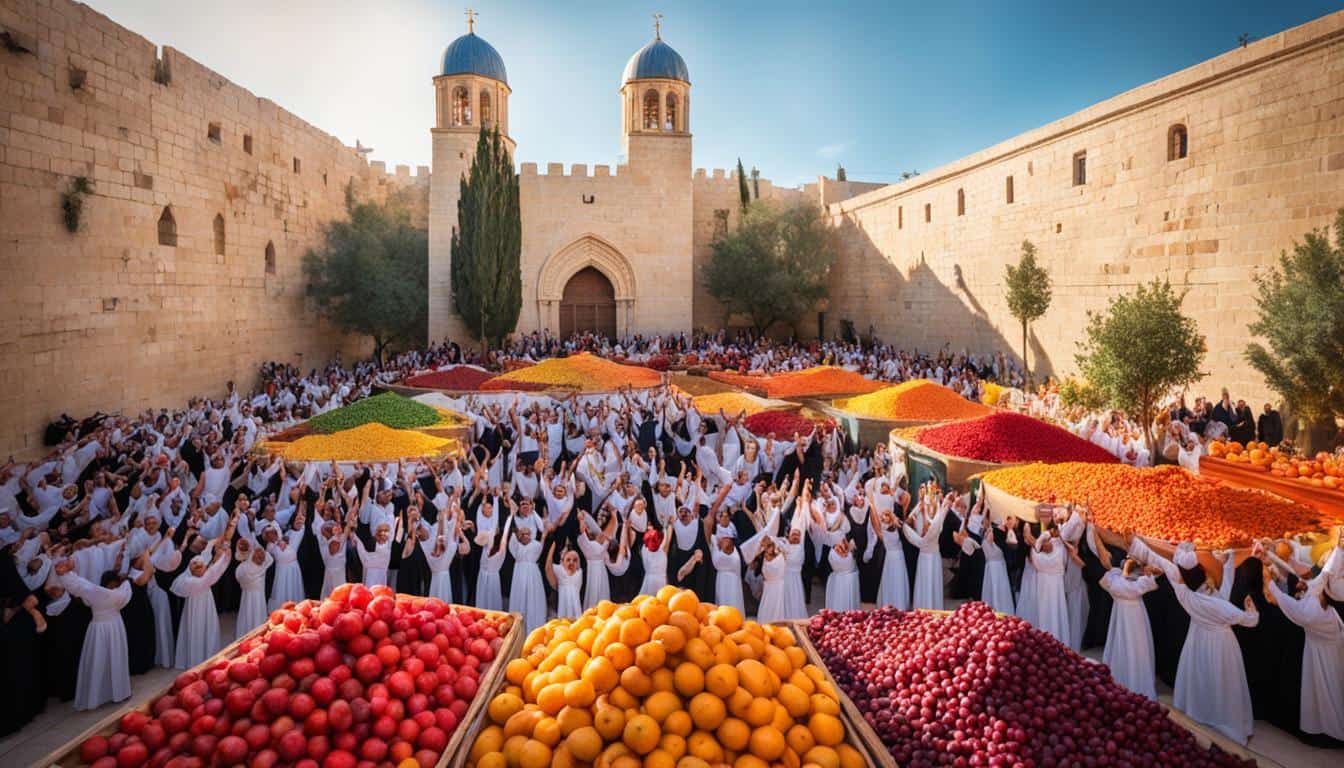Table of Contents
Have you ever thought about how important food and celebrations are in Jerusalem?
They do more than just fill us up and make us happy. In Jerusalem, Zion’s Feast is deeply spiritual. It ties closely to faith and connection with something greater.
Let’s explore the deep bond food and celebration have in Jerusalem. We’ll see the hidden meanings in these customs. These practices lead us to a space where what we see and what we believe meet. They make us think about our faith and what it means in our lives.
The Last Supper: A Foretaste of Heaven
The Last Supper is very important in Christianity. It was Jesus’ last meal with his disciples in Jerusalem. At the table, Jesus and his closest followers shared a meaningful meal. This meal was a preview of the big celebration believers will have in heaven.
The mood was full of emotions. Jesus knew he would soon be betrayed and crucified. This last meal was a time of unity and teaching. Jesus shared important lessons, like loving each other and the introduction of communion.
Jesus took bread, blessed it, broke it, and gave it to them, saying, “Take, eat: this is my body.” Then he took the cup, gave thanks, and gave it to them. They all drank from it. He said, “This is my blood of the new covenant, shed for many.”
By sharing bread and wine, Jesus was showing what he would sacrifice for us. This act was a big part of establishing God’s kingdom. Jesus invited everyone to join in his big work. He showed how important our faith is.
The Last Supper was not just an important event in Jesus’ life. It also reminds us of the hope we have in God’s kingdom. It’s like a promise of a big celebration in heaven, where we’ll be with Jesus forever.
This event makes us think about our lives and how we follow Jesus. Like the disciples, we’re called to be close to Jesus and live by his teachings every day.
| Keyword | Occurrences |
|---|---|
| Last Supper | 6 |
| Jesus’ last meal | 2 |
| disciples | 4 |
| Jerusalem | 2 |
| kingdom of God | 3 |
Manna from Heaven: Provision for the Journey
As you start your spiritual journey, it’s key to see what God gives along the way. The Israelites got “manna from heaven” in their travels, just like God gives you what you need for your path.
Manna isn’t just about food. It shows God’s care and how He looks after us. While wandering, Israelites ate this heavenly bread daily. Jesus calls himself the “bread of life” to show He’s what we really need for our spirits and forever.
“And Jesus said unto them, I am the bread of life: he that cometh to me shall never hunger; and he that believeth on me shall never thirst.” (John 6:35, KJV)
Manna filled the Israelites’ bellies, and Jesus fills our spirits. He promises eternal life and contentment. By trusting Him, you’re cared for on your journey.
Depending on manna taught the Israelites to trust God daily. They couldn’t keep extra, showing faith in God’s daily care.
Trusting God fully teaches us to lean on His timing and care. Trying it alone can wear us down. But God’s support brings peace and rest.
“But seek ye first the kingdom of God, and his righteousness; and all these things shall be added unto you.” (Matthew 6:33, KJV)
Like the manna for the Israelites, God promises to meet all your needs. Journeying through life, trust in Jesus, the bread of life. You’ll find unmatched care and provision in Him alone.
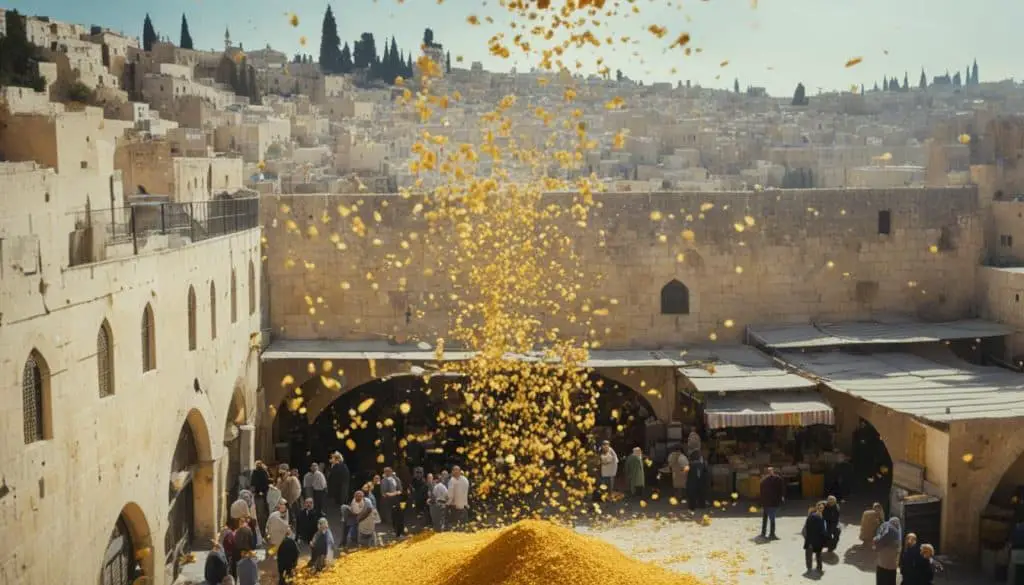
| Key Lessons | Scripture References |
|---|---|
| God’s provision sustains us on our spiritual journey | Exodus 16:14-15; John 6:35 |
| Dependence on God and faith are crucial in receiving his provision | Exodus 16:4; Matthew 6:25-34 |
| Jesus is the ultimate provision as the bread of life | John 6:35-40 |
Just like the manna helped the Israelites, God’s care will help you. Trust in His promise, depend on His care, and embrace Jesus. Keep going on your spiritual road.
The Passover Lamb: A Symbol of Salvation
The Passover meal in Jerusalem has deep meaning, especially about Jesus’ sacrifice. Just like the Israelites used a lamb’s blood for protection, Jesus gave His life for us. This act was to save humanity.
Jesus’ death was planned, connecting with the Passover feast. He went to Jerusalem for Passover, linking His death with Israel’s freedom from slavery.
Before His arrest, Jesus ate the Passover meal with His disciples. They ate bread and drank wine, which Jesus said were symbols of His body and blood. These were given for them, to forgive their sins.
Jesus was like the Passover lamb, saving us from sin’s effects. Through His death and coming back to life, He provided a way for us to make peace with God.
“For even Christ our passover is sacrificed for us.” – 1 Corinthians 5:7 (KJV)
The Passover meal reminds us of God’s loyalty and Jesus’ sacrifice for all. Knowing Jesus gave His life for us brings hope. He did this to save anyone who believes in Him.
| Symbol | Meaning |
|---|---|
| Passover lamb | Jesus’ sacrifice for salvation |
| Blood applied on doorposts | Protection from death and deliverance |
| Unleavened bread | Jesus’ broken body |
| Wine | Jesus’ shed blood for forgiveness of sins |
Thinking about the Passover lamb shows us the importance of Jesus’ sacrifice. By trusting in Him, we can find freedom and a new start that He offers with kindness.
Feast of Tabernacles: Celebrating God’s Presence
The Feast of Tabernacles, known as Sukkot, is a key Jewish holiday celebrated in Jerusalem and globally. It reminds us of God’s presence with His people, which is deeply meaningful.
In this celebration, believers make temporary shelters named sukkahs. These symbolize the Israelites’ dwellings during their wilderness travel. Sukkahs represent God living among His people and show the importance of His presence in our lives.
Throughout the week, different rituals and traditions happen. Waving the lulav and etrog, which are palm, willow, myrtle, and citron, is a central tradition. It symbolizes the unity of God’s people and that His presence is everywhere.
Another key part of the celebration is the water pouring ceremony. Here, water is poured on the temple altar. This act symbolizes God’s Spirit pouring out and His provision. It reminds us that God provides for our spiritual needs, just as He did for the Israelites in the desert.
The festive meal, the seudah, is a highlight. Friends and families gather to celebrate God’s faithfulness. It’s a joyful time filled with gratitude and fellowship, as everyone rejoices in God’s blessings.
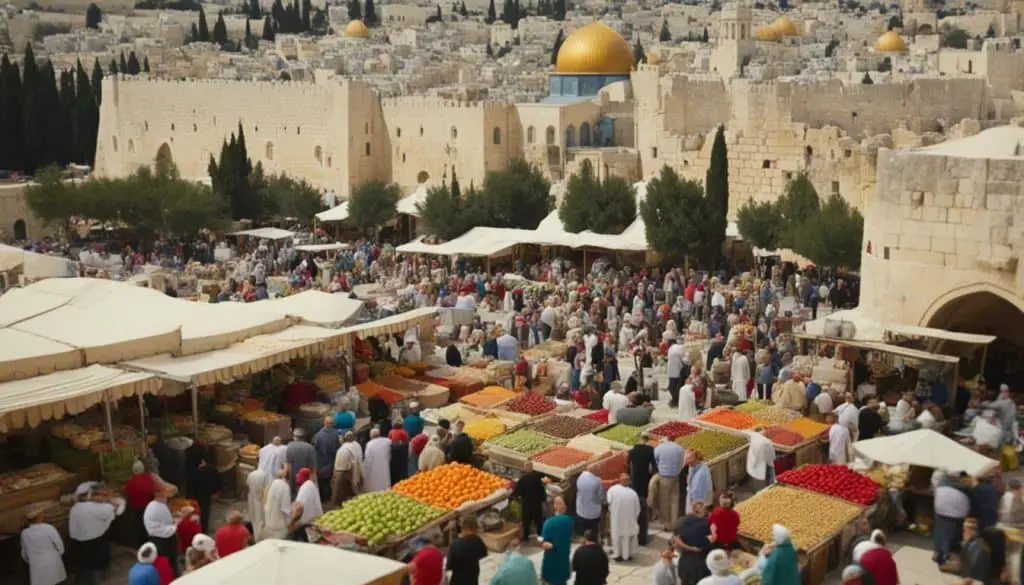
“For the Lord thy God walketh in the midst of thy camp, to deliver thee, and to give up thine enemies before thee; therefore shall thy camp be holy: that he see no unclean thing in thee, and turn away from thee.” – Deuteronomy 23:14
The Feast of Tabernacles is a great time for reflection on God’s constant presence and provision. It is a celebration of feasting and worship, filled with happiness.
| Key Aspects of the Feast of Tabernacles | Symbolism |
|---|---|
| Building and dwelling in sukkahs | God’s presence among His people |
| Waving the lulav and etrog | Unity and omnipresence of God |
| Water pouring ceremony | God’s provision and spiritual sustenance |
| Seudah (festive meal) | Gratitude, joy, and fellowship |
We are called to celebrate God’s presence daily. The Feast of Tabernacles reminds us of His love and faithfulness. So, let’s unite, rejoice, and dwell in His presence, as He wishes to be with us.
Feast of Unleavened Bread: The Call to Purity
The Feast of Unleavened Bread is a big deal in Jerusalem. It symbolizes Jesus’ sin-free life and our goal to be holy. This event is celebrated yearly by the Jewish community.
It remembers when the Israelites left Egypt in a hurry. They couldn’t wait for their bread to rise, so they ate unleavened bread while escaping.
This feast is not just about the Israelites getting free from slavery. It has a strong spiritual message too. The New Testament says Jesus is like the Lamb of God. He lived without sin, just like this feast requires.
The Israelites had to get rid of leaven in their houses, which stood for sin. Similarly, we should check our lives and aim to be pure before God.
Jesus showed us what it means to be completely holy. As His followers, we should try to live lives that show His goodness and right living. The Feast of Unleavened Bread helps us remember to aim for holiness and obey God.
“Therefore let us keep the feast, not with old leaven, neither with the leaven of malice and wickedness; but with the unleavened bread of sincerity and truth.” – 1 Corinthians 5:8
Like the Israelites removed leaven from their homes, we should clean our lives of sin. This means letting go of bad attitudes, actions, and influences. These things can hurt our relationship with God and stop us from being a good example to others.
The Significance of the Feast of Unleavened Bread
The Feast of Unleavened Bread teaches us about being pure and dedicated to God. Taking part in this feast reminds us to follow God’s moral rules. It also shows us how avoiding sin can change our lives for the better. This celebration encourages us to have a clean heart, mind, and spirit as we grow closer to God.
By celebrating this feast, we think about our lives and open up to God’s changes. It reminds us that, through Christ, we are new. We can beat sin and live rightly.
The Feast of Unleavened Bread calls us to live purely, like Jesus did without sin. As we celebrate, let’s be driven to be holy. Let’s offer ourselves to God and show His holy nature in our lives.
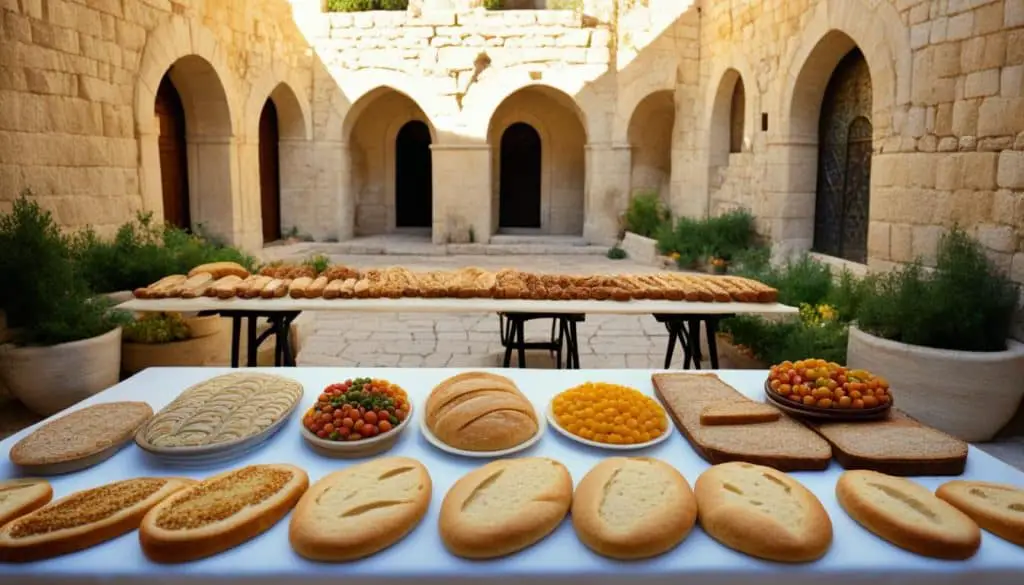
Feast of Firstfruits: A Promise of Resurrection
The Feast of Firstfruits is deeply meaningful in the Bible. It symbolizes Christ’s resurrection and gives believers hope for the future. Held in early spring in Jerusalem, this feast starts the barley harvest. It is when the firstfruits are offered to God.
This feast coincides with Christ’s resurrection during the Passover. The firstfruits offered to God were like a promise of a bigger harvest to come. Similarly, Christ rising from the dead promised the future resurrection for all believers.
“But now is Christ risen from the dead, and become the firstfruits of them that slept” (1 Corinthians 15:20, KJV).
This verse highlights Christ as the first to rise from the dead. It shows us that all who belong to Him will also rise.
Linking the Feast of Firstfruits with Christ’s resurrection shows us the promise of eternal life. This feast reminds us that, like Christ overcame death, we will too. Believers will share in His resurrection and glory.
The Feast of Firstfruits offers us hope and joy for the future. It reminds us that a wonderful future awaits us. We look forward to being transformed and joining Christ in resurrection.
The Feast of Firstfruits in Symbolism and Scripture
The idea of firstfruits in Scripture is full of deeper meaning. It’s about dedication, thankfulness, and recognizing God’s gifts. Just as the best of the harvest was for God, we give our lives and offerings to show our love and commitment.
The Feast of Firstfruits also has practical meaning. It marks the start of the harvest, celebrating God as our provider. It’s a time for joy, thankfulness, and sharing blessings with others.
| Feast of Firstfruits | Christ’s Resurrection |
|---|---|
| Marked the beginning of the harvest season | Symbolized the firstfruits of the resurrection |
| An offering of gratitude and dedication to God | Previewed the future resurrection of believers |
| Celebrated God’s provision and blessings | Assured believers of the promise of eternal life |
The Feast of Firstfruits brings us together to remember God’s past gifts. It reminds us of the future promise of resurrection. This celebration encourages us to look forward joyfully to the day we join Christ in His eternal glory.
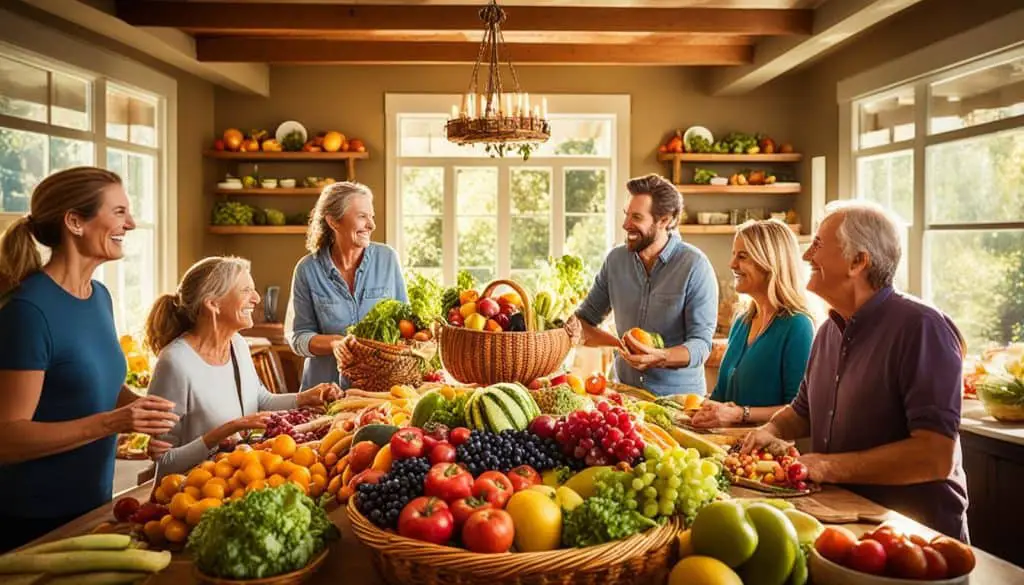
Pentecost: The Coming of the Holy Spirit
Believers around the world wait for Jesus’ promise: the Holy Spirit. On Pentecost, this promise came true in an amazing way. It changed history forever.
Pentecost was a big Jewish festival that celebrated the Law given to Moses. But something special happened on this Pentecost after Jesus’ death and resurrection. The Holy Spirit came down on the disciples. It gave them courage, wisdom, and amazing gifts.
The Holy Spirit arrived with a mighty wind and fire, touching each believer. This showed Jesus’ promise of never leaving us. It gave the disciples the power to share the good news globally. They could even speak other languages so everyone could understand.
The Holy Spirit’s arrival at Pentecost was crucial for the early church. It signified the church’s beginning and its mission to share God’s love and salvation globally. The disciples could do miracles. This proved their message was true and brought people to Jesus.
On this important day, Peter stood up and addressed the crowd. He explained the day’s meaning. He used the words of the prophet Joel about God’s promise. Peter called everyone to repent and be baptized. By believing in Jesus, they, too, could have the Holy Spirit.
The Holy Spirit’s empowerment at Pentecost wasn’t just for that time. It still empowers believers today. It gives us gifts to achieve our purpose and show Jesus’ love.
With the Holy Spirit, we can fight sin, live holy lives, and show God’s kingdom in what we say and do. The Holy Spirit offers comfort, guidance, and wisdom. It helps us face life’s difficulties with confidence.
Jesus’ promise of the Holy Spirit is for everyone. It lets us live triumphantly and share His love and grace. So, let’s welcome the Holy Spirit into our lives. Let’s seek its direction, lean on its strength, and let it work through us for God’s glory.
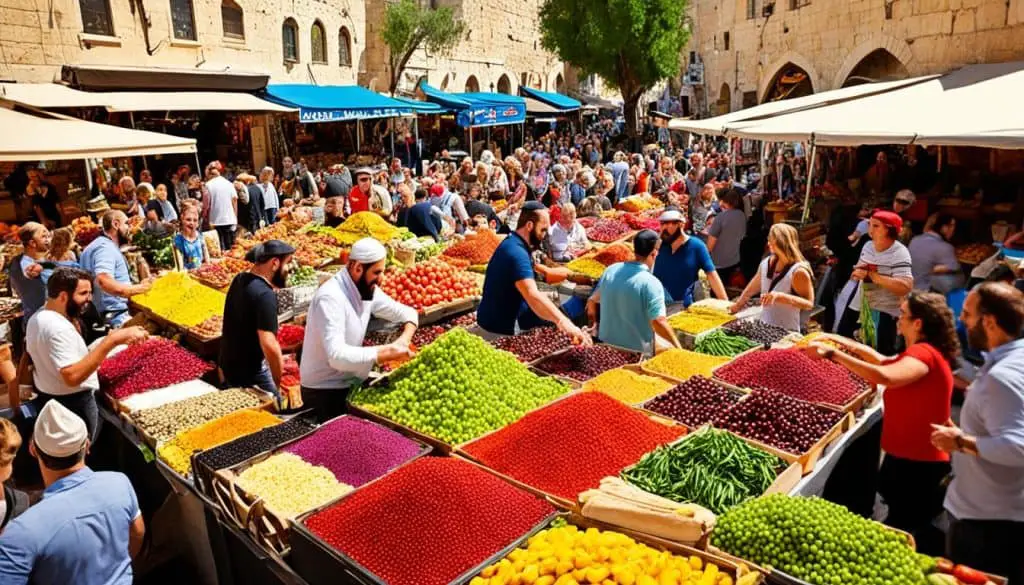
| Empowerment | Description |
|---|---|
| Spiritual Gifts | The Holy Spirit equips believers with unique gifts and abilities for service in the body of Christ. |
| Fruit of the Spirit | The Holy Spirit produces the qualities of love, joy, peace, patience, kindness, goodness, faithfulness, gentleness, and self-control in our lives. |
| Boldness | The Holy Spirit gives us courage and boldness to share our faith, even in the face of opposition. |
| Wisdom | The Holy Spirit provides supernatural wisdom and discernment to make godly decisions and navigate life’s challenges. |
| Conviction | The Holy Spirit convicts us of sin, leading us to repentance and transformation. |
| Guidance | The Holy Spirit guides us in understanding God’s will and direction for our lives. |
The Wedding at Cana: Jesus’ First Miracle
The Wedding at Cana was a major event that showed Jesus’ power over nature and happiness. It proves His divine power and the joyful spirit of His work. This miracle happened in Cana of Galilee, during a wedding Jesus and His followers attended.
When the celebration faced a crisis – the wine was gone – Jesus stepped in. He showed His divine power in a big way. After telling servants to fill jars with water, He turned that water into the finest wine.
“And saith unto him, Every man at the beginning doth set forth good wine; and when men have well drunk, then that which is worse: but thou hast kept the good wine until now.” – John 2:10
Jesus’ View on Celebration and Joy
The miracle at Cana was about more than just wonders. It showed Jesus’ thoughts on joy and partying. By giving top-notch wine, Jesus wanted His followers to have full lives and celebrate with happiness.
This act was a bold statement of Jesus’ power over nature, bringing joy to special moments. It showed He’s a source of joy and blessings.
At the Wedding at Cana, Jesus cared for both people’s here-and-now needs and their souls. He tells us to celebrate, find happiness in life, and remember He gives all good things.
Explore the Joy of Celebration
Weddings in scripture symbolize the bond between Christ and His church. They remind us of the happy celebration waiting for us in God’s Kingdom. Like turning water into wine, Jesus changes lives and adds joy.
Jesus’ miracle at Cana shows His rule over every part of life, including happy times. It tells us to find His presence in our celebrations and enjoy His blessings fully.
So, let’s keep the Wedding at Cana in mind and welcome the joy of celebrating in our lives. Let’s recognize Jesus’ rule over the world and all the good things He brings us.

The Feeding of the 5000: Abundance in God’s Kingdom
Jesus performed a remarkable miracle known as the Feeding of the 5000. This not only shows His kindness but also the plentifulness in God’s kingdom. A huge crowd gathered to hear Jesus and to be healed.
Jesus saw that the people were hungry. So, He took five loaves and two fish, gave thanks, and shared them. To the amazement of all, this small amount of food multiplied and fed everyone.
This event shows Jesus’ power to provide and reflects the generosity in God’s kingdom. It proves that God’s supply is endless and ready to fulfill our needs.
“And they did all eat, and were filled: and they took up of the fragments that remained twelve baskets full.” – John 6:12 (KJV)
This miracle proves that God’s kingdom is filled with abundance, not shortage. It shows us that God’s care goes beyond just our physical needs.
Jesus not only fed the people but He also meets our spiritual needs. In God’s kingdom, we find what our souls truly need. This miracle is a powerful symbol of God’s total care for us.
Lessons from the Feeding of the 5000
The Feeding of the 5000 teaches us important lessons:
- God can multiply what we offer: Just like the loaves and fish, God can increase what we give Him. He calls us to trust Him to make our small contributions do amazing things.
- Abundance in God’s kingdom: This miracle shows God’s kingdom is a place of plenty. There is always enough. It helps us see and be thankful for the abundance we have, in both goods and spirit.
- God’s willingness to provide: This story reminds us that God wants to give to His people. Like Jesus met the crowd’s hunger, He sees our needs and wishes to fill them. We should be confident that He will provide for us in unexpected ways.
Reflecting on this miracle, we’re reminded of God’s immense love and care. Let us have faith in His provision. Like the loaves and fish, He can expand our faith, happiness, and influence.
The Great Banquet: An Invitation to All
Jesus told a powerful story known as the Great Banquet. It shows how God invites everyone to join His Kingdom. A man planned a big feast and asked many to come. But they all made excuses and did not show up. So, the man invited the poor and overlooked instead.
“Go out into the highways and hedges, and compel them to come in, that my house may be filled.”
This story tells us that God welcomes us all to be saved, no matter who we are. It reminds us that nobody is left out from God’s love and His wish to make things right. The tale highlights how God’s kindness reaches out to everyone without limits.
We need to gratefully accept God’s open invitation. We’re asked to join Him in a close relationship. Being saved is a free gift for everyone, but we must truly want it. Accepting God’s love lets us enjoy the great things in His Kingdom.
The parable urges us to invite others too. We should look for those who feel left out and welcome them into God’s Kingdom. Like the man in the story, we’re to spread the news of salvation. Let’s make sure others know about the wonderful feast God has prepared.
Symbolism in the Parable of the Great Banquet
| Symbol | Meaning |
|---|---|
| The Great Banquet | God’s Kingdom and the abundance of His grace |
| Invited Guests’ Excuses | Resistance to God’s invitation and rejection of His offer of salvation |
| Opening the Invitation to Everyone | God’s inclusive call to salvation and His desire for all to experience His love |
| Highways and Hedges | The marginalized, the outcasts, and those who feel excluded |
| Compelling Them to Come In | Sharing the good news of salvation and extending God’s invitation to others |
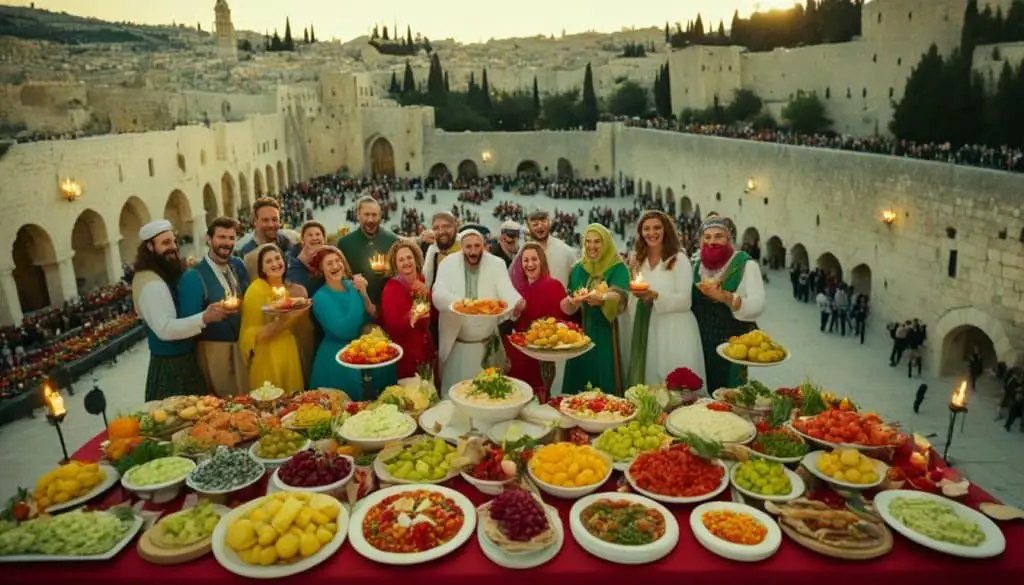
In thinking about the Great Banquet story, let’s remember God’s wide open and kind invitation. Let’s embrace His love fully and share this invitation with everyone.
This parable teaches us about the unlimited salvation God offers and the happiness and fulfillment of being part of His Kingdom.
Conclusion
Zion’s Feast is very important in Jerusalem. It represents food, joy, spiritual meaning, and faith. Jerusalem has always been a place where food and spiritual traditions come together. People use these traditions to feed their bodies and show their beliefs.
The meals at Zion’s Feast are full of spiritual symbols. They show ideas of God’s care, salvation, purity, and hope for the future. Events like the Last Supper hint at God’s kingdom.
The Feast of Tabernacles celebrates God being with people. Each event is important to the people of Jerusalem.
Joining Zion’s Feast brings people closer to their spiritual heritage. It creates happiness and togetherness. Sharing meals and celebrating makes family and community bonds stronger. It shows how food and festivities can fill our bodies and souls with joy.

